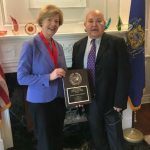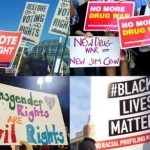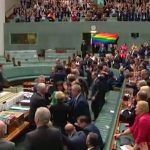LOS ANGELES — Lesbian, gay, bisexual and transgender (LGBT) actors face continued discrimination, even as workplace opportunities and conditions improve, according to a first-of-its kind report by UCLA’s The Williams Institute and the performers’ union SAG-AFTRA (Screen Actors Guild-American Federation of Television and Radio Artists). The report entitled, “Sexual Orientation and Gender Identity Diversity in Entertainment: Experiences and Perspectives of SAG-AFTRA Members,” found one-third of all survey respondents believed that casting directors, directors, and producers may be biased against LGBT performers, and more than half of LGB performers had heard anti-gay comments on set. While the study shows industry discrimination, respondents’ opinions indicate that SAG-AFTRA members provide a supportive environment for LGBT performers; and many lesbian and gay respondents said they would encourage others to come out.
The report was presented at a press conference during the inaugural SAG-AFTRA National Convention in Los Angeles.
“We were pleased to see that our membership is overwhelmingly supportive of LGBT actors, and that many LGBT actors found benefits in coming out,” said Duncan Crabtree-Ireland, SAG-AFTRA’s Chief Administrative Officer and General Counsel. “Nonetheless, coming out remains a significant and consequential decision for many performers and we are committed to supporting our members in living honest and authentic personal and professional lives.”
“The survey results show both progress and indications that more work will be necessary to make the workplace an equal and fully welcoming place for LGBT performers,” said co-author M. V. Lee Badgett, Williams Distinguished Scholar. “The good news is that almost no one thought that opportunities for LGBT actors were getting worse.”
Findings suggest LGBT performers may have substantial barriers to overcome in their search for jobs. Almost half of lesbian and gay (LG) respondents and 27 percent of bisexual respondents, for example, strongly agreed that producers and studio executives think LG performers are less marketable. Nine percent of LG respondents and four percent of bisexual respondents reported that they had been turned down for a role due to their sexual orientation. Further, LGBT respondents were less likely than non-LGBT respondents to have an agent, which may put them at a disadvantage when looking for work.
On the job, the report found:
• Over a third of LGBT performers had witnessed disrespectful treatment that has also been noticed by non-LGBT performers.
• Overall, 16% of LGBT respondents reported that they had experienced discrimination. Gay men were the most likely to report they have experienced some form of discrimination, with one in five reporting an experience. Bisexual actors were about half as likely to report discrimination as gay or lesbian actors.
• Gender nonconforming gay and bisexual men were more likely to experience discrimination, as were men who were out professionally.
The report finds that most heterosexual performers (29 percent) have never played an LG role over the course of their career, but 58 percent of LGB performers and 33 percent of bisexual performers have. Notably, respondents were less likely to have played a transgender role, with only 14 percent of LG performers and 8 percent of bisexual performers having played a transgender role; few non-LGBT performers (3 percent) have played a transgender role.
“Some study respondents felt that choosing to play an LGBT character limited future casting opportunities,” said Jody L. Herman, Peter J. Cooper Fellow and Manager of Transgender Research at the Williams Institute. “Given LGBT actors are significantly more likely to play LGBT characters, these actors are disproportionately impacted by any casting bias based on prior LGBT roles.” Indeed, about one quarter of LGB respondents who have played an LGBT role reported that experience had an impact on their ability to get non-LGBT roles.
This study expands the research on diversity and inclusion in entertainment and provides the first insight into how sexual orientation and gender identity influence performers’ experiences working in the profession. This report is based on an original survey conducted with SAG-AFTRA members, which was fielded from September through December 2012. The survey was developed with the input of SAG-AFTRA members who attended focus groups to discuss issues facing LGBT performers in the entertainment industry. The survey covers a range of topics, including demographics, work history, attitudes and beliefs of respondents and others in the entertainment industry, the workplace climate for LGBT performers, and experiences looking for work and working as a performer. SAG-AFTRA emailed a link to the online survey to its 160,000 members in the Fall of 2012. From September to December, 5,692 members responded, including self-identified 465 gay men, 61 lesbians, 301 bisexual men and women, and 7 transgender respondents.
Click here for the full report.















